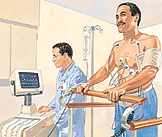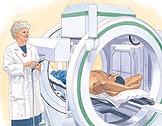Cardiac Nuclear Imaging (Nuclear Stress Test)
Cardiac nuclear imaging tests how well the heart functions and if there are any blockages in the heart. The test is also sometimes called a "perfusion scan." For the scan, a safe amount of radioactive matter called "tracer" is delivered into the bloodstream. A camera then scans the tracer in the blood as it flows through the heart muscle. The tracer leaves your body within hours. This test can be done in a hospital or test center.
Before Your Test
|

|
|
 A scanning camera takes pictures of blood flow through the heart muscle.
|
-
The entire test will take a few hours. For best results, prepare for your test as directed.
-
When you schedule the test, be sure to mention all the medications you take. Ask if you should stop taking any of them the day of the test.
-
Before your test, stop smoking and avoid caffeine for as long as directed. This includes avoiding medications that have caffeine as an ingredient.
-
Don't eat or drink for 4-6 hours before the test. Sips of water are okay.
-
On the day of the test, dress for comfort. Wear a two-piece outfit, top and bottoms. Be sure to wear walking shoes.
During Your Test
-
You may be asked to change into a hospital gown for the test. At some point, scanning pictures will be taken while you rest. This may be done before you exercise. Or, you might have to return for resting scans later that day or the next.
-
You will be attached to EKG and blood pressure monitors. An IV (intravenous) line will be started in your arm.
-
You will exercise on a treadmill or stationary bike for a few minutes. This increases the rate of blood flow to your heart muscle.
-
Speak up when you feel that you cannot exercise for even 1 more minute. At this point, the tracer is given to you through the IV.
-
If you cannot exercise, special medications can be used to increase heart rate.
-
After you have received the tracer, you will be positioned on the scanning bed.
-
You must lie very still for up to 30 minutes. During this time, a scanning camera will be taking pictures. The images will show where blood flows through your heart muscle.
After Your Test
Before going home, ask when you may eat. Also, find out when to resume taking any medications you were told to skip before the test. If you need to return for resting scans, follow any instructions. Most people can go back to their normal routine as soon as all parts of the test are finished.
Let the Technologist Know:
-
What medicines you take.
-
If you have diabetes, knee or hip problems, arthritis, asthma, or chronic lung disease.
-
If you have had a stroke or have vascular disease of the leg.
-
If you are pregnant, think you might be, or are nursing.
Report Any Symptoms
Be sure to tell the doctor if you feel any of the following during the test:
-
Chest, arm, or jaw discomfort
-
Severe shortness of breath
-
Dizziness or lightheadedness
-
Leg cramps or pain
Publication Source: American Heart Association
Online Source: American Heart Association
Date Last Reviewed: 2005-01-01T00:00:00-07:00
Date Last Modified: 2009-11-17T00:00:00-07:00
![]() (727) 259-7818
(727) 259-7818